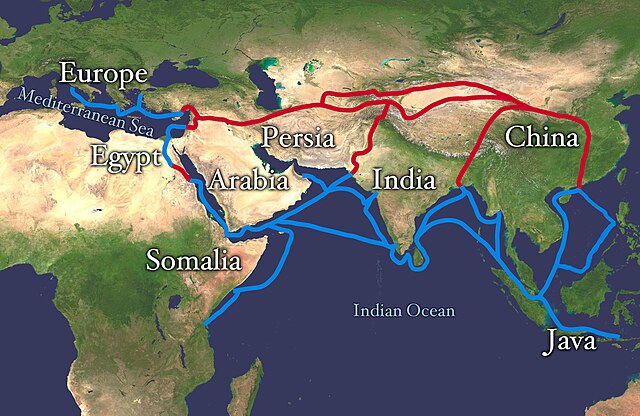
The Silk Road
For over one and half millennia, the Silk Road served as a 4,000-mile-long trade route, connecting Africa, Europe and Asia. It was hugely influential in the development of cultural exchange and ideas, particularly between the great civilisations of China and Rome. The Silk Road laid the foundations for an interconnected global economy that continues to shape our way of living today.
Origins Of The Silk Road
The Silk Road originated in China’s Xi’ province an during the Han Dynasty in 130BC and earned its name from the prominent trade of Chinese silk. China’s desire for trade with its neighbouring regions encouraged the development of this vast exchange network, that traversed deserts, mountains and plains. Due to its enormous length, very few traders travelled its entire distance, however. Middlemen such as those found in India would form trading posts known as caravanserais to receive goods from China, managing the remainder of the journey to Europe or Africa. Perhaps the most famous traveller to venture on the silk road was Marco Polo.
Items Of Trade
Travelling by camel and horseback, traders ranging from nomads to diplomats exchanged a variety of exotic goods. These included items such as silk, horses, paper, spices, tea, jade, glassware, furs and slaves. The goods were used to create exquisite outfits and precious trinkets for royalty and the wealthy. Spices were used in cooking but also in religious ceremonies and medicinal practices. The rise of traded goods helped economies to flourish along the silk roads path.
Cultural Exchange
As the importance of the silk road grew, towns and settlements began to appear along its length, providing opportunities for rest stops and further trade. The exchange of diplomacy, languages, religions and artistry led to the cross-cultural transfer of ideas and customs. Religious missionaries travelled the road to spread their beliefs, such as the Buddhist monks from the Kushan Kingdom who bought ideologies of Buddhism to China. Silk road cities began to attract scholars and philosophers and became known as centres for intellectual exchange.
Technical Innovations
As cultural exchange continued, new information gave rise to technologies and innovations, growing economies and facilitating cultural evolution. Craftsmanship, agricultural practices, scientific methods and valued goods paved the way for global advancement. Military technology and resources shared throughout the network had a large impact on warfare; the Mongol empire flourished from the introduction of horses to China, while Chinese gunpowder influenced conflicts in Europe.
Silk Road Decline
Due to the vastness of the silk road and the lack of responsibility for its maintenance, its condition deteriorated. Robberies were common and merchants began to travel in groups known as caravans for safety. Eventually, traders began to find direct routes to trade with China by way of maritime routes, which negated the need for middlemen. In 1453 AD, the Ottoman empire closed off Chinese trade with the West and the silk road as a commercial force ended. The silk road routes and the maritime ones that usurped it are pictured above.
It is thought that the Black Death of the late 1340s, which reduced the population of Europe by perhaps as much as 50%, likely spread along the silk road from Asia. Today, some parts of the silk road are protected by UNESCO and there are initiatives such as the Belt & Road effort, launched in 2013 by Chinese President Xi Jinping, to re-establish infrastructural links to Eurasia. These measures signify the value that this trade route once held and its current importance for exchange in modern society.
If you are interested in studying History as a subject, Oxford Open Learning offers you the chance to do so at IGCSE and A level. You can find out more by clicking on the links below, or you can Contact Us.